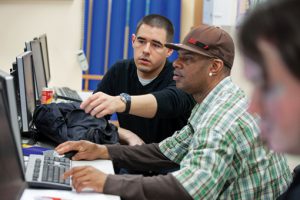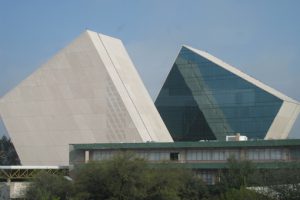Monday Memo: Iguala Students—Cuban Internet—Nicaragua Canal—Strike in Haiti—Unasur facilitates U.S.-Venezuela dialogue
Likely top stories this week: Independent forensic team deems Mexico’s 43 missing students case inconclusive; Cuban authorities to expand Internet centers in 2015; archaeological relics uncovered along Nicaragua Canal route; a general strike in Haiti on eve of Carnival; Unasur seeks to facilitate U.S.-Venezuela dialogue. Independent Forensic Team Deems Mexico’s 43 Missing Students Case Inconclusive: … Read more

Civic Innovator: Alessandra Orofino
Alessandra Orofino’s globetrotting career as a student and human rights advocate has always flirted with political activism. The 25-year-old Rio de Janeiro native has lived in Montreal, Paris, New Delhi, and New York. But when she returned to Rio in 2008 to work as a field researcher on gender-based violence, she realized that the most … Read more

Cuba: The New Leaders
Yoani Sánchez smiles during a news conference that was part of her 80-day tour of South America, Europe and the U.S. in 2013. Photo: UESLEI MARCELINO/REUTERS. Read profiles of: Miguel Díaz-Canel Yamina Vicente MalPaso The Faculty of Economics Yoani Sánchez Miguel Díaz-Canel By Michael Voss Up from the provinces: Miguel Díaz-Canel waves to the crowds … Read more

Business Innovator: Diego Saez-Gil
Sitting in a dingy Internet café in a strange city and paying in 15-minute increments to use a computer is no traveler’s idea of fun. After backpacking through 23 European countries, Argentine-born Diego Saez-Gil knew there had to be a better alternative. The advent of smartphones inspired him to invent one: an app that could … Read more

Bridge Institutions in Higher Education
The United States and Latin America are both struggling to find ways to improve participation in quality education in the face of a labor-market skills gap. But all too often, policymakers, businesses and educators have looked to elite universities as a way of meeting those gaps. While important for high-end jobs, labor market and social … Read more

Higher Ed: Private Investors Get Into the Game
The combination of sustained economic growth in Latin America, a region-wide expansion of the middle class, and a newly competitive business environment has boosted demand for quality education, and stoked desires for alternatives. The alternatives are coming from a slew of new and lower-cost online courses. This innovation has produced a wave of private investment … Read more

MOOCs in Development: Fad or Future?
Those following tech and continuing education news have been surprised by the rising popularity of Massive Open Online Courses (MOOCs).1 The basic promise for professionals in Latin America and the Caribbean is quite alluring: free online access to a world-class knowledge base. But questions remain. Will this new learning methodology last, or fade quickly once … Read more

Ask the Experts: Higher Education
Artur Cherbowski Lask answers: It’s important to keep in mind that a region consists of different countries, each with its own needs and strengths, and bound to its particular culture and history—although tied firmly to a common, shared history and culture. In this mosaic, universities try to respond to their regional, national and local demands. … Read more

Higher Education and Competitiveness
Articles: The Future of Latin American Studies by Charles Hale The prospects have never been better. Full text available. published article?1 Protest U. by Indira Palacios-Valladares Latin America’s students are angry—and getting angrier. Student Debt in the Americas by Carolina Ramírez A threat to the region’s middle class? Full text available. Academic Brain Drain by … Read more
Approval of Reforms Jolts Mexican Telecommunications Powerhouse
Mexican telecom giant América Móvil stands to lose its stronghold on the telecommunications market after the Mexican Congress approved legislative reforms on Wednesday intended to break down telecommunications monopolies in the country. President Enrique Peña Nieto proposed the reforms on March 24 as part of his campaign to create more competition in the Mexican telecommunications … Read more
Yoani Sánchez Launches Online Newspaper
Cuban dissident Yoani Sánchez launched 14ymedio, an online-only newspaper, on Wednesday morning. The outlet is meant to be an alternative to the state-controlled media, but Sánchez said that it will not serve as a platform to criticize the government. Rather, it will “contribute information so that Cubans can decide, with more maturity, their own destinies,” … Read more

Political Innovator: Mardoqueo Cancax
Growing up in the Indigenous municipality of Patzún, Guatemala, Mardoqueo Cancax experienced first-hand the frustration of living in a community without good roads and adequate infrastructure. But when he became a parent, he felt even more keenly how such challenges imperiled the future of Patzún’s children. He joined a parents’ committee working on municipal development … Read more
USAID Creates “Cuban Twitter” to Provoke Unrest
The U.S. Agency for International Development (USAID) covertly created “ZunZuneo”—a Cuban version of the online messaging network Twitter—to cause civil unrest in Cuba, the Associate Press reported on Thursday. The program functioned through cell phone messaging to avoid the Cuban government’s controls over internet use, and planned to build a network that could mobilize quickly … Read more


